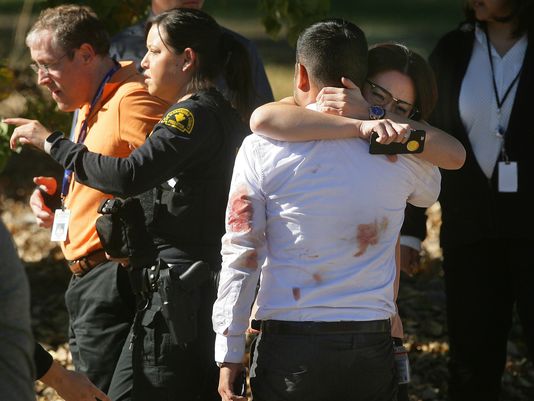(Freedom.news) What’s that we hear from the “national security hawks” on Capitol Hill: Mass surveillance will keep us safe? That Congress and the president must ignore the Fourth Amendment’s privacy guarantee in this “age of terrorism” so they can improve public safety and prevent terrorist attacks?
Yes, well, tell that to the families of the 14 dead Americans in San Bernardino, Calif., as well as the others who were wounded when two people with emerging terrorist ties waltzed into their holiday party and shot the place up.
In fact, as top security experts will tell you, mass surveillance is not effective and actually puts the nation more at risk.
Consider: As per Zero Hedge, the former chief of the National Security Agency’s global intelligence-gathering operations, Bill Binney, told Washington’s Blog that mass surveillance actually disrupts the government’s ability to locate and interrupt bad guys plotting bad things. The government failed to identify plots that led to the 9/11 attacks, the Boston Marathon bombings, the shootings at Fort Hood, Texas, and, most recently, the terrorist attack in San Bernardino, Calif., because of being overwhelmed with data and having too few analysts and resources to adequately sift through it in a timely manner.
Binney said:
A good deal of the failure is, in my opinion, due to bulk data. So, I am calling all these attacks a result of “Data bulk failure.” Too much data and too many people for the 10-20 thousand analysts to follow. Simple as that. Especially when they make word match pulls (like Google) and get dumps of data selected from close to 4 billion people.
This is the same problem NSA had before 9/11. They had data that could have prevented 9/11 but did not know they had it in their data bases. This back then when the bulk collection was not going on. Now the problem is orders of magnitude greater. Result, it’s harder to succeed.
Expect more of the same from our deluded government that thinks more data improves possibilities of success. All this bulk data collection and storage does give law enforcement a great capability to retroactively analyze anyone they want. But, of course,that data cannot be used in court since it was not acquired with a warrant.
In separate comments to Zero Hedge, Binney added:
I always like to point to the obvious. Look at what is happening in France and Belgium after the attack in Paris. They are going after targeted individuals, who they knew were related to the killers before the attack. And, it’s working!!! So, this is what I have been saying they should do all along.
Do a targeted selection of data from the communications based on known people and their attributes and you can succeed (as now in France and Belgium) instead of the bulk collection on everyone which buries them in data and they fail. After the attack and people die, they do the right thing. This should make it obvious what route to take.
Interestingly, following the San Bernardino attacks, we learned that the suspects were actually under FBI surveillance, and yet were never dealt with in time to prevent the attacks that left 14 dead and nearly 20 wounded.
“The recent massacre at the Inland Regional Center in San Bernardino, Calif., in which a married Muslim couple killed 14 people and wounded 21 others is further proof that the surveillance state does not work. Americans have surrendered 100 percent of their privacy for a surveillance state that continues to fail them,” wrote Julie Wilson for NaturalNews Dec. 4.
But unfortunately, we are getting no shortage of intelligence experts and politicians crying for more mass surveillance. In fact, following the mid-November ISIS-connected terrorist attacks in Paris, which left 130 people dead, the Obama administration called for new powers to access via “back doors” all cell phones and other devices, Cyberwar.news reported.
Richard Clarke, counterterrorism czar under Presidents Bill Clinton and George W. Bush, agrees that mass surveillance is a loser in terms of protecting the country, and that surveillance ought to be more targeted, premised upon specific information, and above all constitutional.
“I am troubled by the precedent of stretching a law on domestic surveillance almost to the breaking point. On issues so fundamental to our civil liberties, elected leaders should not be so needlessly secretive,” he told Washington’s Blog in June 2013.
“The argument that this sweeping search must be kept secret from the terrorists is laughable. Terrorists already assume this sort of thing is being done. Only law-abiding American citizens were blissfully ignorant of what their government was doing,” he added.
See also:


